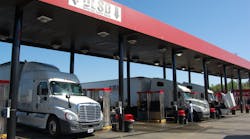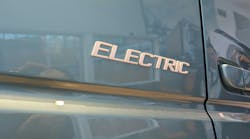A new report issued yesterday by the U.S. Energy Security Council (USESC) and compiled with the help of the Institute for the Analysis of Global Security (IAGS) is calling for the “easing” of tax and regulatory barriers where transportation fuels are concerned as a way to significantly improve the nation’s energy security profile.
“The energy policy goal of the U.S. since the Arab oil embargo that occurred 40 years ago this week has been energy independence; in effect importing less oil,” said Gal Luft, IAGS’s co-director and an advisor to the USESC, during a press conference yesterday in Washington D.C.
“During that time, Republicans have called for more domestic oil drilling and Democrats have called for reductions in demand; in effect, both have occurred, with the U.S. now importing just 36% of its oil today compared to 60% in 2005,” Luft said.
Yet over the past several years, he explained that the price oil has nearly doubled, with oil payments now making up one-half of the U.S.’s trade deficit versus just a third not many years ago. “We’re more [energy] self-sufficient but poorer and deeper in debt,” Luft noted. “What is wrong is that we’ve neglected to deal with the real problem: the monopoly oil has over the transportation sector. Our cars and trucks are built to run on nothing but petroleum fuels, and that’s played into the hands of OPEC [Organization of Petroleum Exporting Countries].”
Thus the USESC believes that a new strategy must be deployed to help the U.S. truly improve on energy security: introducing competition into the transportation fuel market by what the group called “smoothing regulatory hurdles” that circumscribe market entry for both fuel competitive vehicles and competing fuels.
“Opening the door to greater numbers of vehicles open to a variety of fuels and speeding approval of those fuels as a package would allow for more competition,” the USESC noted in its report.
“If we are to achieve true energy security and insulate ourselves from countries that whether by design or by inertia effectively use oil as an economic weapon against us and our allies, America must adopt a new paradigm – one that places oil in competition with other energy commodities in the sector from which its strategic importance stems: the transportation fuel market,” the group said. “Moreover, the technology to convert these resources into fuel is, in large part, is mature and economic. There is no need for subsidies.”
Luft added in his remarks that in what he called “an era of government shutdowns and feuding over debt-ceilings,” there is no more room for proposals calling for billions in government programs to provide energy alternatives.
“We simply don’t have the money right now,” he said. “That’s why the Council’s plan proposes no subsidies, no tax breaks, no giveaways, and does not rely on future technologies. It’s about removing the regulatory barriers to fuel competition.”
The Council’s report noted that while the simplest policy pathway to opening vehicles to fuel competition is the Open Fuel Standard (OFS) – a technology-neutral policy that would require most light duty vehicles sold in the U.S. be capable of running on another fuel in addition to or instead of gasoline or diesel, whether liquid fuel, gaseous fuel, electricity, or some combination thereof – and that “flex fuel” vehicles be at the least gasoline-ethanol-methanol compatible to count as fuel competitive. Yet the Council admitted that a “strong aversion” to mandates among some political constituencies presents a tough challenge.
Thus the Council’s report presents several “alternative pathways” to achieving a similar outcome, ones it said avoids the need for a politically challenging mandate:
- Congress should create a topline fuel competition CAFE [Corporate Average Fuel Economy] credit for automakers that open at least half of the vehicles in their fleet to competing fuels, and ensure automaker compliance with CAFE counts as compliance with greenhouse gas regulations under the Clean Air Act.
- For flexible fuel vehicles to count as fuel competitive vehicles, they should be gasoline-ethanol-methanol flexible, not just gasoline-ethanol flexible.
- CAFÉ rulemaking should be re-focused on the original goal of energy security, prioritizing the reduction of oil’s importance through a performance-based, technology-neutral approach.
- As part of this effort, the metric of miles-per-gallon (mpg) in CAFE should be abandoned as the principle measurement of success since energy density differs across fuels.
- The Environmental Protection Agency [EPA] should further deregulate the conversion kit market to enable safe, but low-cost, conversions by “secondary market vehicles” to run on substitute fuels.
- The process EPA has recently opened to consider certifying a higher octane fuel in the Tier 3 rulemaking should be expanded to include all alcohol fuels and the broadest range of blends feasible.
- Fuels should be allowed equal treatment under the federal tax code, and thus taxed on an energy content basis rather than a volume basis. State and local governments should also tax fuels equivalently using energy content instead of on a volume basis.
- EPA should level the playing field and not include upstream emissions for non-petroleum fuels when determining the CAFE “compliance value” for light-duty vehicles, and for other purposes, since it does not do so for gasoline.
- EPA should remove bureaucratic hurdles that thwart states from utilizing transportation fuel strategies that improve air quality to meet their Clean Air Act obligations. Congress should also consider more innovative solutions to expand this flexibility, including the creation of a market for particulate matter that would cover one pollutant from multiple sources and sectors.
Yet how such strategies could affect the heavy vehicle market remains uncertain. Indeed, one issue now being debated where commercial trucks are concerned is what happens to diesel fuel surcharges if the trucking industry begins to make a broad shift away from diesel to natural gas.
“Shifting to natural gas creates a very different conversation where fuel is concerned,” Ken Gillies, manager of truck purchasing and engineering for GE Capital Fleet Services, told Fleet Owner in a recent interview.
“The challenge is that fuel surcharges are used by the vast majority of carriers and in many cases represent a significant portion of their [profit] margin. But at some point, if the industry goes in the direction of natural gas, the shippers will ask why they are paying surcharges for a fuel that’s not being used,” he noted. “For the carrier, how would such a change affect their payback calculations for that [natural gas] fuel?”
IAGS’ Luft also noted in his remarks that there must be an “international” component to America’s energy security efforts as well, one that forges closer links to those nations now importing the most oil, especially China.
“Our report recognizes that China must be part of the solution; it is now the world’s largest automotive market and oil importer,” he said. “No significant advances in energy security can be made without China’s participation.”
To that end, the USESC’s report makes the following suggestions:
- Form a U.S.-China-Brazil alcohol fuels initiative; an initiative that can be expanded to include other countries with robust alcohol fuels programs.
- Expand international collaboration on electric vehicles with specific focus on those research areas which could lead to significant cost reduction in automotive batteries.
- Develop international standards for aftermarket retrofits that make vehicles flexible fuel or CNG [compressed natural gas] compatible.
- Expand the U.S.-China Shale Gas Resource Initiative: Collaborate with China and other emerging shale gas producers on the development of new fracking techniques, new fracking fluids, safety standards and environmental best practices.
- Engage in international efforts to reduce methane flaring: Collaborate with major methane flaring nations on identifying economic and environmentally sustainable strategies to turn unused methane into usable fuel.
In the end, Luft said that the U.S. government must take a comprehensive, holistic view of energy policy as it relates to vehicles and fuels.
“Opening the door to fuel competitive vehicles and reducing the regulatory barriers to non-petroleum fuels would reduce the strategic importance of oil with its attendant national security implications,” he explained. “This will also reduce the nation’s vulnerability to oil price shocks.”



